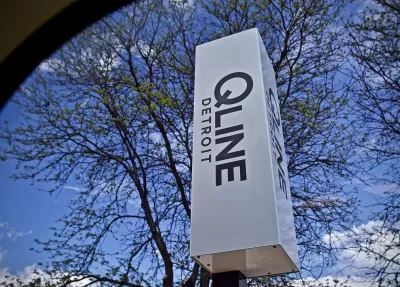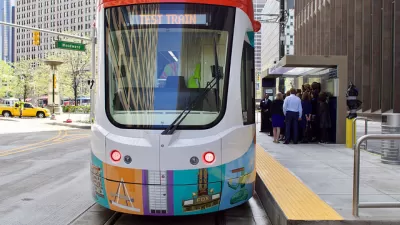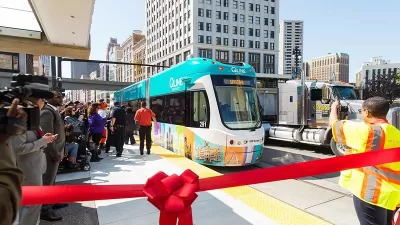Since Detroit's new streetcar system started charging, ridership has dropped. Those who are riding aren't necessarily paying anyways.

Starting September 5, Detroit's new QLine streetcar system has begun charging fares after a summer where rides were free. The result has been a drop in ridership from 5,000 to 3,000 daily riders. Chad Livengood of Crain's Detroit Business writes that the young system operator's are still bullish on the system's prospects after seeing signs of ridership growth in evening commuters and for special events. However, one of the challenges is still getting riders to pay the fare.
The percentage of riders actually paying was 40 percent, which QLine spokesman Dan Lijana said is higher than 32.5 percent national average of similar downtown city rail systems.
At a 40 percent pay rate, that means an average of 1,200 riders are paying fares on a daily basis through either daily, monthly or annual passes.
The QLine's operators have a goal of an average daily ridership of 5,000 from this month through next September.
In addition to ongoing education programs on the new fare system through "QLine ambassadors," Livengood reports that payment enforcement through transit police may be required in the future.
FULL STORY: 40% of QLine riders paying as ridership falls

Maui's Vacation Rental Debate Turns Ugly
Verbal attacks, misinformation campaigns and fistfights plague a high-stakes debate to convert thousands of vacation rentals into long-term housing.

Planetizen Federal Action Tracker
A weekly monitor of how Trump’s orders and actions are impacting planners and planning in America.

In Urban Planning, AI Prompting Could be the New Design Thinking
Creativity has long been key to great urban design. What if we see AI as our new creative partner?

King County Supportive Housing Program Offers Hope for Unhoused Residents
The county is taking a ‘Housing First’ approach that prioritizes getting people into housing, then offering wraparound supportive services.

Researchers Use AI to Get Clearer Picture of US Housing
Analysts are using artificial intelligence to supercharge their research by allowing them to comb through data faster. Though these AI tools can be error prone, they save time and housing researchers are optimistic about the future.

Making Shared Micromobility More Inclusive
Cities and shared mobility system operators can do more to include people with disabilities in planning and operations, per a new report.
Urban Design for Planners 1: Software Tools
This six-course series explores essential urban design concepts using open source software and equips planners with the tools they need to participate fully in the urban design process.
Planning for Universal Design
Learn the tools for implementing Universal Design in planning regulations.
planning NEXT
Appalachian Highlands Housing Partners
Mpact (founded as Rail~Volution)
City of Camden Redevelopment Agency
City of Astoria
City of Portland
City of Laramie





























